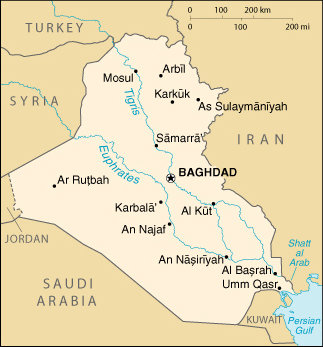Bomb blast in Kirkuk as Iraqi parliament debates elections law
 Baghdad - A bomb exploded near a mosque in Kirkuk on Thursday morning, as Iraqi lawmakers prepared to return for what some said could be a decisive debate on voting in the disputed city.
Baghdad - A bomb exploded near a mosque in Kirkuk on Thursday morning, as Iraqi lawmakers prepared to return for what some said could be a decisive debate on voting in the disputed city.
The blast shook central Kirkuk's al-Mansur mosque but caused no casualties, police told Baghdad's Aswat al-Iraq news agency. There was no immediate claim of responsibility.
Thursday's attack came as lawmakers said they expected to put to a vote a law to cover parliamentary elections now scheduled for January 16. Debate over the conduct of elections in the city has forestalled a vote on the law several times in recent weeks.
Many Iraqi Kurds hope to make Kirkuk, and its nearby oil fields, the capital of an independent state, calling it their "Jerusalem." Iraqi Arab and Turkmen politicians regard the city and surrounding al-Tamim province as an integral part of Iraq.
According to the Iraqi constitution, the parliamentary elections must take place by the end of January. Lawmakers missed the October 15 deadline that would provide election workers the 90 days they say they need to organise elections in time to meet the January 16 voting date.
Tensions have been high in the region as debate on the elections law has come to a head.
Speaking after the parliament for northern Iraq's semi-autonomous Kurdish region ratified a new cabinet there Wednesday, Kurdish President Massoud Barzani insisted that Kirkuk must be part of the Kurdish region.
"We want (Kirkuk) incorporated into our region, because the majority of the population is Kurdish," he said. "We will not agree to any other solution."
His statements came as Iraqi soldiers moved into the disputed area of Daquq, 45 kilometres to the south of Kirkuk, Amir Khawa Karam, the head of the local council, told the German Press Agency dpa.
Karam, a politician from the Patriotic Union of Kurdistan, one of the partners in government in the semi-autonomous Kurdish region to the north, said the soldiers had told Kurdish Peshmerga militias to leave the area.
"We will not accept any form of interference from ... the Iraqi army in the administrative affairs of the region of Daquq," he said.
Kurdish and Arab lawmakers say the debate in parliament has hinged on Kirkuk's voter registration rolls.
Arab and Turkmen lawmakers look with suspicion at a dramatic increase in Kurdish voters in the city recorded in the 2009 voter rolls from the last rolls, taken in 2004, and want them examined.
Kurdish lawmakers have said that they would support such a measure if the voting rolls from other provinces were also examined. Arab lawmakers have rejected this as impractical, and so debate has centred on whether the 2004 or 2009 voting rolls would be used.
Thursday's debate will be "critical," Iraqi lawmaker Shatha al-Musawi told dpa Wednesday.
"If the differences are not resolved and no consensus is reached, the political blocs in parliament are likely to maintain the 2005 elections law, despite the popular opposition to it," he said.
Al-Musawi said he believed there were enough votes in parliament to pass a plan for voting in the city based on the 2004 rolls.
On Wednesday, Kurdish lawmaker Mahmud Othman told reporters the Kurdish parliamentary bloc would boycott a vote on a law based on the 2004 voter rolls for Kirkuk.
Lawmakers have sought a consensus solution to forestall that possibility and the possibility that Iraqi President Jalal Talabani, himself an ethnic Kurd, might veto such a measure. (dpa)